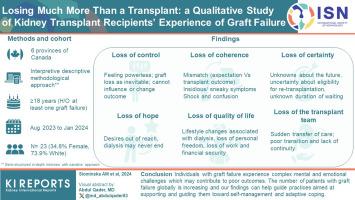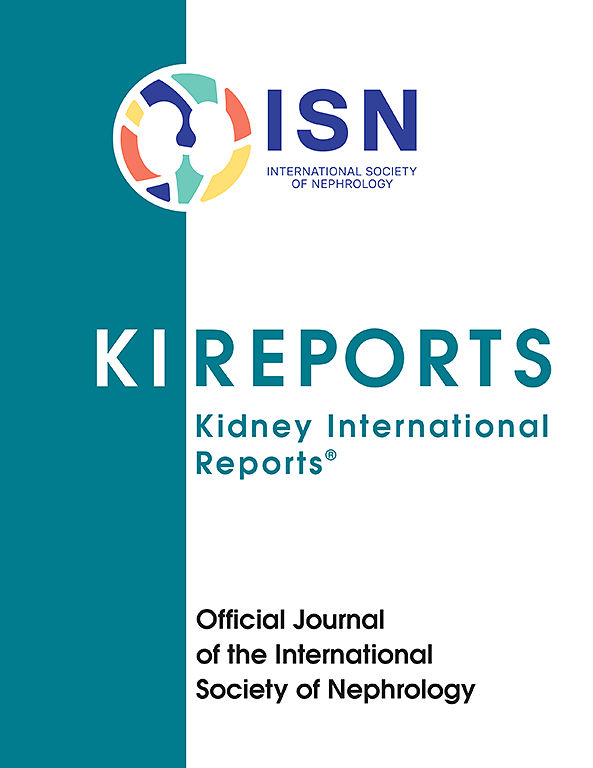Losing Much More Than a Transplant: A Qualitative Study of Kidney Transplant Recipients’ Experiences of Graft Failure
IF 5.7
2区 医学
Q1 UROLOGY & NEPHROLOGY
引用次数: 0
Abstract
Introduction
Kidney transplant recipients with graft failure are a growing cohort of patients who experience high morbidity and mortality. Limited evidence guides their care delivery and patient perspective to improve care processes is lacking. We conducted an in-depth exploration of how individuals experience graft failure, and the specific research question was: “What impact does the loss of an allograft have on their lives?”
Methods
We adopted an interpretive descriptive methodological design. Semistructured in-depth narrative interviews were conducted with adult recipients who had a history of ≥1 graft failure. Data were collected until data saturation was achieved and analyzed using an inductive and thematic approach.
Results
Our study included 23 participants from 6 provinces of Canada. The majority were on dialysis and not waitlisted for retransplantation (60.9%). Our thematic analysis identified that the lives of participants were impacted by a range of tangible and experiential losses that go beyond the loss of the transplant itself. The themes identified include loss of control, loss of coherence, loss of certainty, loss of hope, loss of quality of life, and loss of the transplant team. Although many perceived that graft failure was inevitable, the majority were unprepared. The confusion about eligibility for retransplantation appears to contribute to these experiences.
Conclusion
Individuals with graft failure experience complex mental and emotional challenges which may contribute to poor outcomes. The number of patients with graft failure globally is increasing and our findings can help guide practices aimed at supporting and guiding them toward self-management and adaptive coping.

失去的远不止移植:肾移植受者移植失败经历的定性研究
导言:肾移植受者中出现移植失败的患者越来越多,他们的发病率和死亡率都很高。指导其护理服务的证据有限,缺乏从患者角度改善护理流程的方法。我们对个人如何经历移植物失败进行了深入探讨,具体的研究问题是:"方法我们采用了解释性描述方法设计。我们对移植失败次数≥1次的成年受者进行了半结构化深度叙事访谈。收集数据直至达到数据饱和,并采用归纳和主题方法对数据进行分析。结果我们的研究包括来自加拿大 6 个省的 23 名参与者。大多数人都在接受透析治疗,并且没有列入再移植的候选名单(60.9%)。我们的主题分析发现,参与者的生活受到了一系列有形和经验损失的影响,这些损失超出了失去移植本身的范围。确定的主题包括失去控制、失去连贯性、失去确定性、失去希望、失去生活质量以及失去移植团队。尽管许多人认为移植失败不可避免,但大多数人却毫无准备。结论移植失败的患者会经历复杂的心理和情感挑战,这可能会导致不良后果。全球范围内移植失败患者的数量正在不断增加,我们的研究结果有助于为旨在支持和指导他们进行自我管理和适应性应对的实践提供指导。
本文章由计算机程序翻译,如有差异,请以英文原文为准。
求助全文
约1分钟内获得全文
求助全文
来源期刊

Kidney International Reports
Medicine-Nephrology
CiteScore
7.70
自引率
3.30%
发文量
1578
审稿时长
8 weeks
期刊介绍:
Kidney International Reports, an official journal of the International Society of Nephrology, is a peer-reviewed, open access journal devoted to the publication of leading research and developments related to kidney disease. With the primary aim of contributing to improved care of patients with kidney disease, the journal will publish original clinical and select translational articles and educational content related to the pathogenesis, evaluation and management of acute and chronic kidney disease, end stage renal disease (including transplantation), acid-base, fluid and electrolyte disturbances and hypertension. Of particular interest are submissions related to clinical trials, epidemiology, systematic reviews (including meta-analyses) and outcomes research. The journal will also provide a platform for wider dissemination of national and regional guidelines as well as consensus meeting reports.
 求助内容:
求助内容: 应助结果提醒方式:
应助结果提醒方式:


